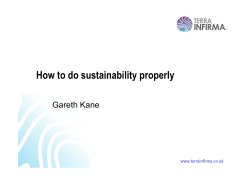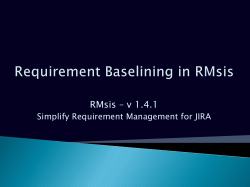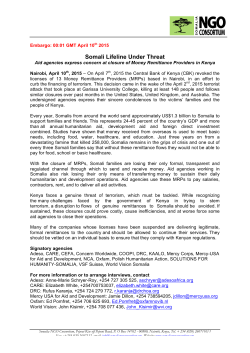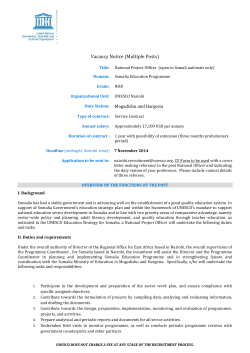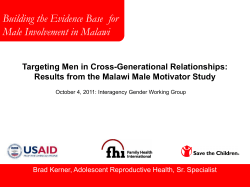
full Consultancy TOR here
Adeso Terms of Reference for the Somalia Community Recovery and Economic Support (SCORES) Phase II Project Organization Adeso, www.adesoafrica.org Position Title SCORES II Project Baseline Assessment Consultancy Position Location Sanaag and Mudug regions of Somalia/Somaliland. Duration 30 days M&E manager as technical and Program manager as the functional Reporting to management SCORES II Field Teams (In part work with Programme development and Working with quality team in Nairobi) Starting date ASAP Application deadline 29th May, 2015 Please send applications to consultancy@adesoafrica.org – Adeso will only Vacancy contact respond to short-listed applicants. ORGANIZATIONAL BACKGROUND Adeso, formerly known as Horn Relief, is an expanding and vibrant African-based international organization, working with communities to create environments in which Africans can thrive. We work to prevent and overcome situations that adversely affect community well-being by: reinvigorating the economy, developing skills for life and work, providing humanitarian aid, and influencing policy. Our belief that economic, social and environmental security is the bedrock of a healthy community drives the nature and intent of our programming. Adeso has been strengthening rural livelihood and delivering innovative humanitarian aid and development programs for the past 20 years. Currently, we have programs in Somalia, Kenya and South Sudan. Adeso is an exciting, dynamic organization experiencing managed rapid growth. It offers sound employment conditions with opportunities for personal growth and development. POSITION SUMMARY Adeso is seeking a competent consulting firm or qualified individuals with specialties in assessing Agriculture & Food Security, Economic Recovery & Market Systems, Water, Sanitation and Hygiene (WASH), and Risk Management Policy & Practice. To assess Adeso’s Somalia Community Recovery and Economic Support phase II (SCORES II) Project, Northern Somalia/Somaliland. The consultancy is for a period of 30 days, beginning 20th May 2015 and will include desk review work, field data collection, data analysis, report writing and a presentation of the findings to the Sanaag and Mudug teams and in Nairobi. Adeso encourages Consultancy firms or groups who can assign consultants specialized in WASH, DRR and in Agriculture & Food security. PROJECT SUMMARY SCORES II project is 12 months USAID funded project employing a community-driven development approach to strengthen social, economic and respond to emergency and recovery projects in Mudug and Sanaag regions including Mogadishu to provide support to vulnerable groups affected by emergency crisis as it was done during phase I. These interventions aims at improving access to food, water and sanitation by protecting livelihood assets and provision of safe water and sanitation facilities, hygiene promotion and to build resilience among most affected households. The project will build on the gains realized in SCORES Phase one project implemented by Adeso in 2013 - 2014, which provided humanitarian assistance as part of recovery response. It also adopted multi sector integrated strategies that link emergency interventions to recovery by strengthening on recovery of livelihood and rehabilitation of communal water sources assets, in order to address emergency needs and develop opportunities for community asset building among most vulnerable households. This project is designed to continue on the works undertaken during phase one to go beyond short-term crisis response and focus on enhancing household capacity to address recurrent problems such as food security and access to water. The proposed programme will include the following major components: provision of agricultural inputs, community based public health initiatives, capacity building and the strengthening of early warning systems to include livelihood-saving early warning messages to communities through the SODMA. These components complement each other and when combined, actively support households to maintain their livelihood strategies while addressing key WASH problems. Adeso and (SODMA) with the support of a Senior Humanitarian Advisor will coordinate, share information and collaborate with the cluster system, U.N. agencies, other NGOs, other donors, local groups, and local and national government agencies in capacity assessment of SODMA staff and help in the development of the wider unit strategic framework. The SODMA will seek to complement coordination mechanisms that already exist while furthering the government’s involvement in disaster management and response. The approach will be further refined but Adeso and SODMA envisage at least monthly meetings with key stakeholders, identification of key disaster management issues as well as developing strategies, standards and timelines to address these Gaps. The project strategy adopted by Adeso in implementing this project will be direct implementation. Adeso has an established presence in the project areas which will provide opportunity of strengthening existing relationships with communities and stakeholders to ensure successful and effective implementation of the project. The project will use the Integrated Community Based Targeting (ICBT) approach through participatory processes at community level. The methodology of ICBT has been intensively used by Adeso in the context of Somalia successfully. The previous experiences of Adeso in targeting of most vulnerable through community participation process will benefit this project. Vulnerable groups including women will be a part of the process and all project interventions. The project will also emphasize interventions specific to women as an integral part of the project strategy. Adeso will strategically target female headed households in order to reach the most vulnerable in supporting the household fully. Adeso has proven that targeting women will better assist the household as men are not always present and are not fully aware of the household or community situation in terms of vulnerability. In addition, to make sure that the most appropriate activities are taken to reach the required objectives and to implement an efficient and sustainable program with demonstrable impact, Adeso is going to set up an effective Participatory M&E system that will generate the required data to help the project staff. OBJECTIVES OF THE ASSIGNMENT The assignment is to carry out a comprehensive baseline survey in the project areas of Mudug and Sanaag regions of Somalia/Somaliland to generate firsthand information to be used for Project Planning Monitoring and Evaluation. The baseline will serve as a benchmark to measure progress, as well as provide information to a wider stakeholder group on understanding the livelihood dynamics and groupings in the region. Furthermore, the assignment is requested to address the M&E aspect of the program, ensuring close monitoring and evaluation of activities and the wider impact on the target population. The baseline assessment taken as the projects pre-intervention evaluation will act as the benchmark to measure progress as well as provide information to a wider stakeholder group on understanding the livelihood dynamics and groupings in the regions. Furthermore, the assignment will help address the M&E aspect of the program, ensuring close monitoring and evaluation of activities and the wider outcome on the target population. There also will be a final project evaluation that will assess whether there has been achievement of the overall and specific objectives of the project, its outcomes on the lives of beneficiaries who will have been directly and indirectly involved in the project activities including their families, communities and what the responses of policy makers are at local, national and international levels after the end of the implementation period hence there is need to make sure that this baseline assessment captures all thematic area indicators specifying some targets to help benchmark them. The assessment should clearly bring out the necessary market conditions that are responsible in sustaining different livelihood groups and help the water mapping of points including their status in the targeted areas. Specifically, the study will focus on food security and Water sanitation and Hygiene indicators with a view to mitigate negative impacts and meet standard requirements under WASH, food security and livelihoods sectors. Community mapping and profiling of target communities will also be undertaken which will include an analysis of the current situation, market opportunities, gaps, and vulnerabilities and challenges to be addressed including the market capacity in relation to agricultural practices, purchasing patterns, water tracking, transport and distribution networks, market absorption capacity of different skills and other livelihood products. The assessment will in part also define some market drivers and their role in creating enabling conditions for the different livelihood groups, covering contextual factors and identifying the gaps to be addressed including identification of value chains that have economic potential in both domestic and international markets. It will also provide of specific and usable recommendations for programmatic approaches to address the immediate priorities with regards to strengthening and expanding opportunities and systems. Information gathered during this exercise will form a baseline to inform programming and to share with other agencies and donors. Develop a more detailed understanding of markets for essential food and non-food items or products; in particular whether there is sufficient demand that it would be possible to increase supply without driving down prices to producers as well as whether there are opportunities for collective marketing or simple quality assurance/grading of produce in order to access better prices. Beneficiaries for this activity will be self-selected from amongst the community members and traders in the villages. With regards to the WASH component, the assessment will help determine the possibility of new water structures being rehabilitated by the community members through cash for work including rating the number of days the workers are going to undertake the rehabilitation of those structures in relations to the regional labour market. The assessment will also ascertain the possibility of water and sanitation capacity building practices to be undertaken to the community water point’s management groups, the community members on how to use or manage the structures. DELIVERABLES 1. Inception Report: includes initial work plan and proposal for the baseline assessment outlining the proposed methodology, survey tools, process of data collection and analysis as well as final set of data-collection tools for all indicators in the log frame. As well as the budget breakdown 2. Draft report of the baseline assessment for the feedback and comments of Adeso. 3. An updated log frame using baseline assessment information. 4. Final work plans and data collection tools for approval prior to fieldwork in Sanag and Mudug. 5. Summary version of the final report to be shared with project communities. 6. Presentation on the main findings of the draft evaluation report for final consensus building to the field team in Sanaag (involving project teams, community representatives and local authorities and country level program teams as applicable, in the presence of line ministry officials) and Programme development and quality team in Nairobi for comments; 7. A final report (three hard copies and a soft copy on CD ROM) in English not exceeding a length of 40 pages (excluding annexes) which includes: a. Summary; b. Introduction; c. Methodology; d. Findings of the baseline study. Baseline information per indicator shall be presented; e. Conclusions and recommendations as per the program’s outcomes, outputs, activities, and indicators; f. Electronic annexes with the site-by-site raw data used for the analysis. SCOPE OF WORK SCORES II project baseline assessment will be done through field visits to project sites in Sanaag and Mudug regions of Northern Somalia/Somaliland. Indirect data collection will be done through extensive literature review, household interviews, observations, focus group discussions and speaking with key informants. The following factors can be used to identify a cross-section of focus areas and interviewees: • Coordination and proposed implementation villages of the project. • Urban / rural setting. • Pastoralist / agro-pastoralist / riverine communities. • Levels of displacement, access to land. • Gender, age, clan, etc. METHODOLOGY The methodology will be further defined by the consultant (in the inception report) and revised at the outset of the consultancy. The expected methodology for such a baseline assessment would include both direct and indirect data collection, analysis, cross-referencing and formulating recommendations. Data collection will be done through targeted locations in target areas. The consultant will finalize the methodology that suits the scope of the baseline assessment. The baseline will mainly focus on the initial assessment of the villages selected by the project. The scope of the coverage of sites will be further reviewed during the baseline survey process. Literature review of existing documents and review of context e.g. monitoring reports, existing data, previous projects etc. It is envisaged that the methodology used during this assessment will include, but not be limited to, the following: Field visits in the implementation areas for sampling, data collection and observations; Household interviews with sampled project stakeholders; Focus group discussions and interviews with field staff and with sample beneficiaries and nonbeneficiaries; Interviews with government agencies and other stakeholders; Reflection and feedback sessions with Adeso Nairobi, field staff and other key informants; Field observations for triangulation of information; Data analysis and validation of findings; Report writing and debriefing with project and HQ management teams. Review of SCORES I monitoring and training reports and all other existing data. WORKPLAN FOR THE EVALUATION A work plan for this assignment should be developed in relation to the methodology suggested by the consultant, and the number of days set for this assignment. This will include a one day briefing on the findings to get input from project staff, as well as build consensus around the recommendations. QUALIFICATION PROFILE At least one consultant with Post graduate degree in FSL, WASH and Agriculture or related field. At least five years of hands on experience in conducting assessments, midterm reviews and evaluations. Experience leading project evaluations/mid-term reviews is essential; Must have profound knowledge in economic analysis of development projects; Familiar with issues related to water resource management (especially subsurface dams and hydro dynamic shallow wells) and agro pastoralist farming practices within Somali cultures; Familiar with environmental issues and semi-arid and arid lands; He/she must be experienced in developing and implementing gender sensitive evaluation methodologies in WASH, Agriculture and other food security frameworks; Experience in assessing DRR interventions and contingency planning; Ability to assess/review critically the project activities and results; Good knowledge and experience in survey design, implementation of surveys and statistical data analysis is required; Experience in the use of participatory appraisal techniques in data collection; Previous work experience in Somalia and knowledge of Somali culture is essential. INTELLECTUAL PROPERTY RIGHTS All documentation related to the assignment shall remain the sole and exclusive property of Adeso. CODE OF CONDUCT All evaluators and evaluation processes must abide by Adeso’s HR Code of Conduct and Adeso’s Child Protection Policy. APPLICATION PROCESS Applications should be submitted to consultancy@adesoafrica.org with the subject line: Application for SCORES II Baseline Assessment not later than 29th May 2015. The selection committee consisting of Project staff will review all applications as they arrive. All applicants must meet the minimum requirements described. The application must have one page cover letter; Technical proposal and proposed budget for the whole assignment. The application package should include the following: A one page application letter addressing the consultant’s previous experience and how it’s relevant to the proposed assignment. It should also indicate the candidate’s availability and consultancy rates. Detailed comprehensive budget. Samples of recently written reports on similar assignments. Updated CVs for all consultants including relevant work experience and qualifications. Contact details for three references.
© Copyright 2025
